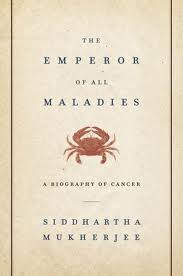
There are too many compelling subplots in Emperor to recount. For me the story how William Halsted and his radical mastectomy set the stage for a century of surgical breast care is alone worth the read. And every pediatric trainee should study the early history of ALL treatment and the work of Sydney Farber. Throughout the author maintains a thread of his own story as an oncology fellow at the Dana Farber. He uses this to pull us into the stories of several of his patients, a feature that made Emperor human.
Perhaps the most important part of the book comes in the final chapter. After 450 pages detailing the 20th century quest to ‘cure cancer’, it is suggested that cancer may well be stitched into our genome. A natural derivative of aging and regeneration. Through its intrinsic integration with natural processes Mukherjee lays the foundation for the idea that cancer may be an inevitable part of who we are.
Cancer, we have discovered, is stitched into our genome. Oncogenes arise from mutations in essential genes that regulate the growth of cells. Mutations accumulate in these genes when DNA is damaged by carcinogens, but also by seemingly random errors in copying genes when cells divide. The former might be preventable, but the latter is endogenous. Cancer is a flaw in our growth, but this flaw is deeply entrenched in ourselves. We can rid ourselves of cancer, then, only as much as we can rid ourselves of the processes in our physiology that depend on growth—aging, regeneration, healing, reproduction…
It is possible that we are fatally conjoined to this ancient illness, forced to play its cat-and-mouse game for the foreseeable future of our species. But if cancer deaths can be prevented before old age, if the terrifying game of treatment, resistance, recurrence, and more treatment can be stretched out longer and longer, then it will transform the way we imagine this ancient illness. Given what we know about cancer, even this would represent a technological victory unlike any other in our history. It would be a victory over our own inevitability—a victory over our genomes.
Mukherjee is a beautiful writer. He has the gift a written voice that can carry off science in a way that keeps you engaged. His use of language had me re-reading sentences and paragraphs. The length of Emperor was tolerable for just this reason. I would recommend it for those deeply interested in cancer’s story.
The link above to The Emperor of All Maladies is an Amazon affiliate link.